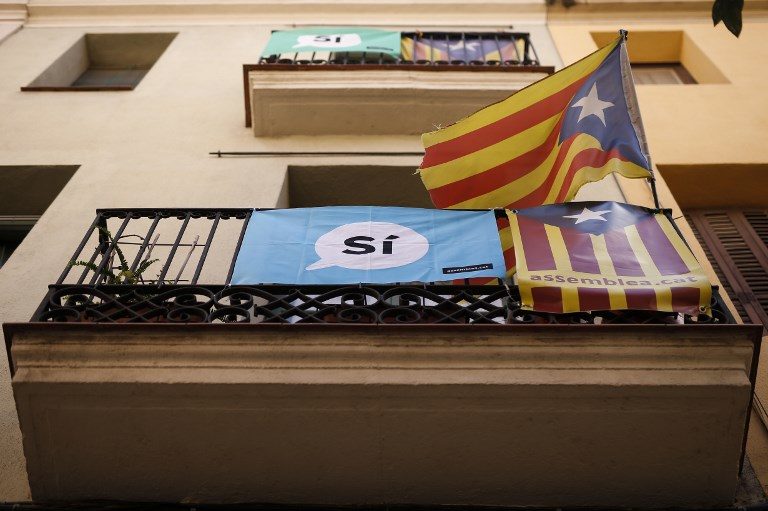SUMMARY
This is AI generated summarization, which may have errors. For context, always refer to the full article.

BARCELONA, Spain – Catalonia’s executive admitted Thursday, September 21, that plans for an outlawed independence referendum had been dealt a major blow by a police crackdown, but vowed to press ahead, urging support from the international community.
In Barcelona, several thousand protesters flooded the streets for a second day running after police detained key members of the team organizing the October 1 vote in the wealthy northeastern region which is deeply divided over independence.
The protesters gathered outside the High Court demanding that the leaders be freed, while a Catalan government spokesman said 8 of the 14 people arrested had been released.
The arrests, as well as the seizure on Wednesday, September 20, of nearly 10 million ballots destined for the vote, have seriously damaged separatist plans to conduct a referendum with a semblance of legitimacy, even if it was never going to be recognized by Madrid.
Regional vice president Oriol Junqueras, whose deputy Josep Maria Jove was among those held, told Catalonia’s TV3 that the crackdown meant “the rules of the game have been changed.”
“The circumstances today are different because a significant part of our team, half of the economics team, has been arrested,” he said.
“That (the referendum) cannot be held in the circumstances that we wanted is obvious,” he said.
Catalonia’s president Carles Puigdemont issued a statement late Thursday saying the referendum would be held “because we had prepared some plans to protect ourselves from any eventuality and guarantee the vote”.
He added “there is the support a huge majority of the population which is fed up with the arrogance and the abuse of the government of the Popular Party” in Madrid.
Puigdemont also tweeted a link to a page where he said Catalans could find their polling stations – although Agence France-Presse (AFP) could not get access when it tried to consult the site.
Scottish leader weighs in
In an open letter published in Britain’s Guardian newspaper, Puigdemont called on the international community “to stand with Catalonia in its defense of democracy and true European values”.
His words earned him the support of Nicola Sturgeon, leader of the pro-independence Scottish National Party who raised concerns about the crackdown, saying the right to self-determination should be respected everywhere.
But the road ahead is complicated.
Police have seized over 45,000 notifications destined for those selected to staff the polling stations.
And they have threatened to arrest mayors who facilitate the vote if they do not comply with a criminal probe. Officials have also tightened control over the region’s finances.
And Spain’s interior ministry has chartered 3 ferries which can house up to 6,600 police who are being sent to back up forces in Catalonia.
The confiscation of millions of ballot papers delivered an added blow.
Also contributing to their woes, the Constitutional Court said Thursday it would impose a daily fine of between 6,000-12,000 euros ($7,100-$14,300) on 24 organizers until they acted in full compliance with an earlier ruling ordering a “suspension of the referendum”.
“Madrid’s legal response to the Catalan challenge looks increasingly likely to stop the organization of the self-determination vote, or at least void it of any legitimacy,” wrote Antonio Barroso, an analyst at Teneo Intelligence.
Resentment growing
But Inigo Mendez de Vigo, spokesman for the Madrid government, defended the measures, telling Spanish radio: “It would be strange if the justice system did nothing when there was disobedience.”
Polls show Catalans are sharply divided on whether they want independence or not, with the latest survey in July showing 49.4% against and 41.1% in favor.
But Madrid’s repeated insistence on the illegal nature of the independence drive has generated much resentment in a region where separatists were once far fewer.
And critics in both camps say the central government has not made any attempt to win over hearts and minds.
This has led to a perception that the central government doesn’t care – a perception exacerbated by the recent economic crisis and the fact that Catalonia pays more in taxes than it receives in investments and transfers from Madrid.
EU officials have remained tight-lipped on the issue regarding it as an internal matter for Spain.
“Recognising Catalonia would create a terrible precedent for the EU, one which Brussels would find very hard to manage and which every separatist movement would try to use in future,” Dan Dungaciu, the head of the Institute of Political Sciences and International Relations of the Romanian Academy told AFP.
‘Not constructive’
Juan Jose Moya, a 63-year-old caretaker who is against independence said that “both governments have bad policies,” referring to the administration in Madrid and the one in Barcelona.
But he was not impressed by the arrests.
“It’s not constructive,” he said.
“It would have been best to have a referendum agreed by the government,” he added, noting that the Catalan executive was also at fault as it had been “unable to negotiate.”
Despite the divisions, a large majority of Catalans want to vote in a legitimate referendum to settle the matter, polls show. – Rappler.com
Add a comment
How does this make you feel?
There are no comments yet. Add your comment to start the conversation.